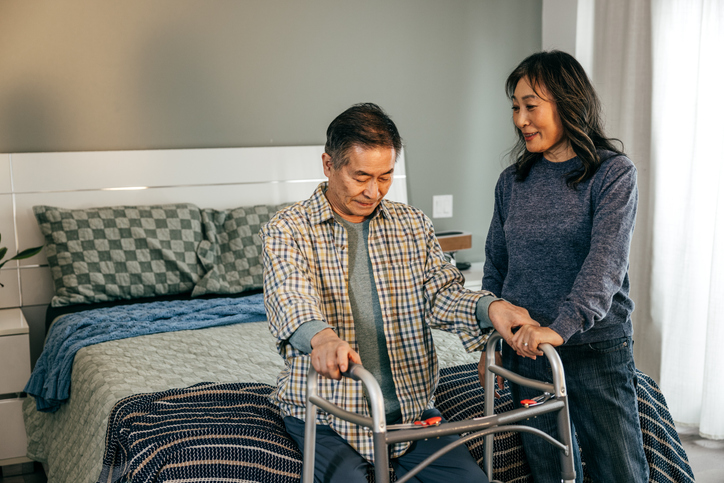Having Surgery—Is Your Home Ready?
August 1, 2025

According to the National Library of Medicine, one in nine Americans has at least one surgery each year. The hospital discharge is just the beginning. Imagine returning home from surgery, groggy and sore, only to discover you can’t climb the stairs, reach the pain meds, or safely take a shower. That’s why preparing your home before the surgery is just as important as the procedure itself. Known as prehabilitation, this proactive approach helps reduce stress, lowers the risk of complications, and prepares you for a safer and smoother recovery.
Here’s everything you need to think about preparing before surgery.
Stay on Top of Recovery
Your doctor is the best resource for preparing for surgery. Ask them what to expect after surgery so that you know how to prepare best. Even when patients are discharged on the day of their surgery, it can take several months to return to normal activities. Following your surgeon’s care instructions can ensure a smooth recovery.
For older patients undergoing joint replacement procedures, physical therapy after surgery is crucial in regaining strength and mobility. “A knee or hip replacement is fundamentally a major surgery,” says Matthew Abdel, an orthopedic surgeon at the Mayo Clinic. “Everything related to that remains essential– preparing the patient, educating the patient, managing expectations, and having a multidisciplinary team in place – all must work together to allow that patient to go home that day safely.”
Things to consider:
- Learn the best way to contact your doctor if you need assistance after the surgery. If your doctor uses a patient portal to communicate with patients, make sure that you are registered and have access before your procedure.
- Know what your pain management plan will be. “Pain after surgery is something that a lot of patients fear,” says Sterling Elliott, a clinical pharmacist and a professor at Northwestern University. “Knowing how to make good decisions about your options, especially nonopioid ones, will help you feel better and make the best progress.”
- Research outpatient rehabilitation facilities that accept your insurance and would be willing to work seamlessly with your doctor.
- Stay on top of your follow-up appointments to ensure timely and effective communication.
Arranging for Help
You’ll likely need support with a variety of tasks after surgery, from getting a ride home from the hospital to potentially requiring round-the-clock care for several weeks. To ensure your safety, most surgeons recommend having someone stay with you the first night after surgery and arranging for a caregiver to be nearby or living with you for the first three to five days of recovery.
Think about the tasks around the home that you’ll be unable to do on your own. Determine who will be helping you after the surgery and make those arrangements in advance.
Things to consider:
- Arrange for someone to collect the mail, tend to the lawn, or dispose of the trash.
- Don’t forget to check the calendar. Reschedule any other appointments as needed and pay all your upcoming bills in advance.
- If you have pets, consider asking a friend or family member to care for them or board them before the procedure. This will allow you to focus on your recovery and avoid an accident with an active pet.
Preparing the Home
Take time to thoroughly clean and organize your home before surgery. Simple touches—like freshly washed sheets on the bed—can provide comfort and make your recovery more restful. Think about the parts of the home that you’ll need access to the most after surgery.
Things to consider:
- Set up your bed on the first floor if possible.
- Ensure you have convenient access to a safe and easy-to-use bathroom during your recovery.
- Fill the closet with clothes that are easy to put on and take off.
- Move everything you’ll need to where you can reach without having to bend down or stretch.
- Shortly before the surgery, buy the groceries you’ll need while recovering at home.
- Meal prep in advance or make full meals to keep you fed for a week or more.
- Place food in a cabinet between your waist and shoulder height and put the dishes you’ll use most on the kitchen counter.
- Use paper products if doing dishes would not be ideal while recovering.
- Keep your phone and charger handy.
To prevent falls, inspect every room for tripping hazards. This includes tucking away electrical cords, installing nightlights, getting clutter off the floor, and securing rugs. Rearrange furniture to create clear pathways for walking, especially if you’ll be using assistive equipment such as crutches or a wheelchair. For more extensive recovery periods, a home healthcare professional can visit your home to provide installation recommendations, such as grab bars in the bathroom or a stairlift in two-story homes.
While preparing the home for an upcoming surgery can be a lot of work upfront, the opportunity to recover in one’s home environment is beneficial. “It satisfies patients,” says Abdel. “You recuperate with your family. You recuperate in your home environment. You don’t feel like you’re institutionalized.”
Many people feel apprehensive before surgery, but poor mental health can negatively affect recovery. Anxiety and depression are shown to increase pain and stress, as well as slow wound healing. Getting outside, making time for enjoyable activities, and eating a healthy diet are all ways people can care for their mental health before undergoing surgery. With Insureyouknow.org, you may store all of your medical and financial records in one accessible place, giving you one less thing to worry about while you recover.
